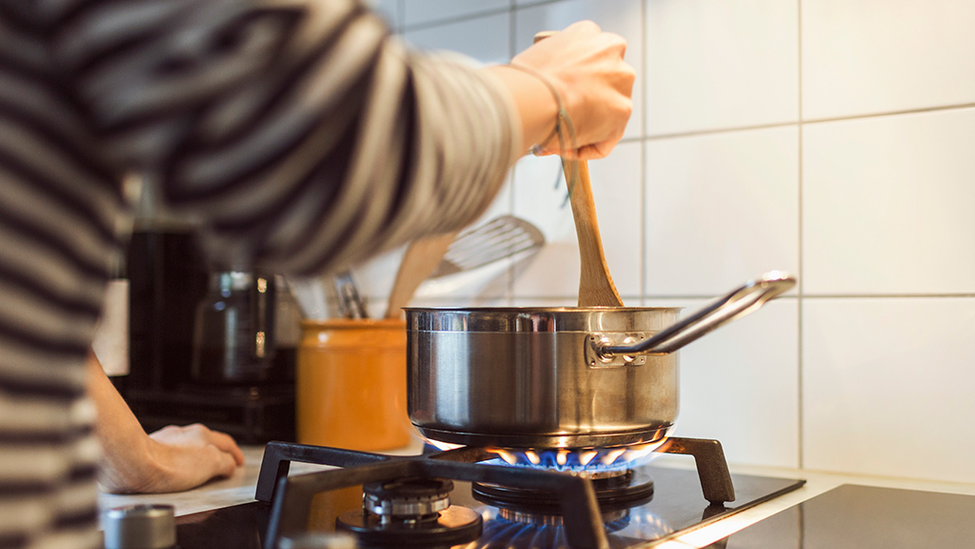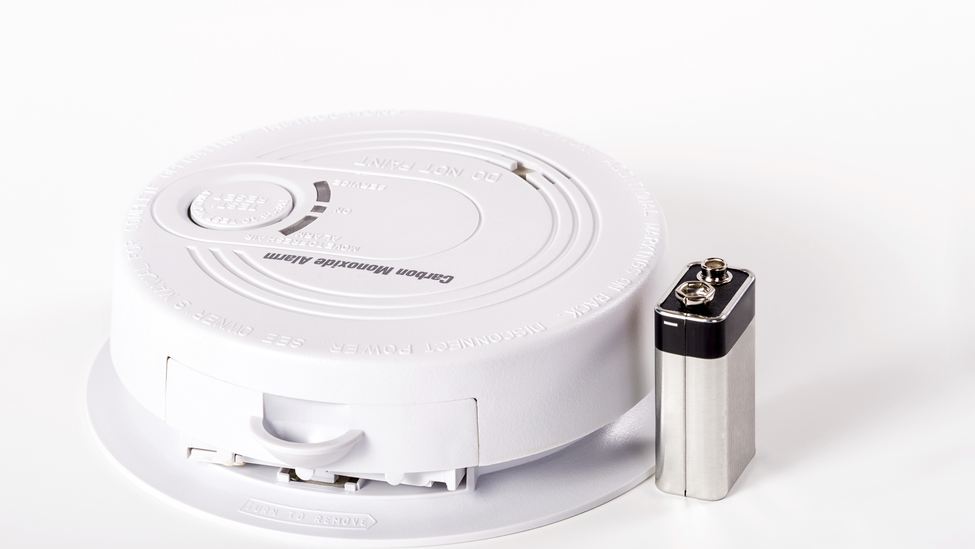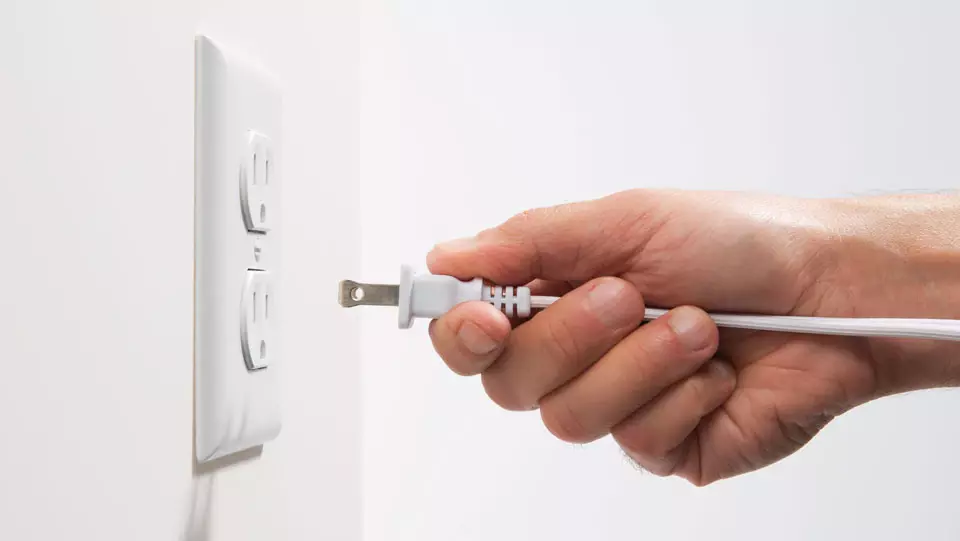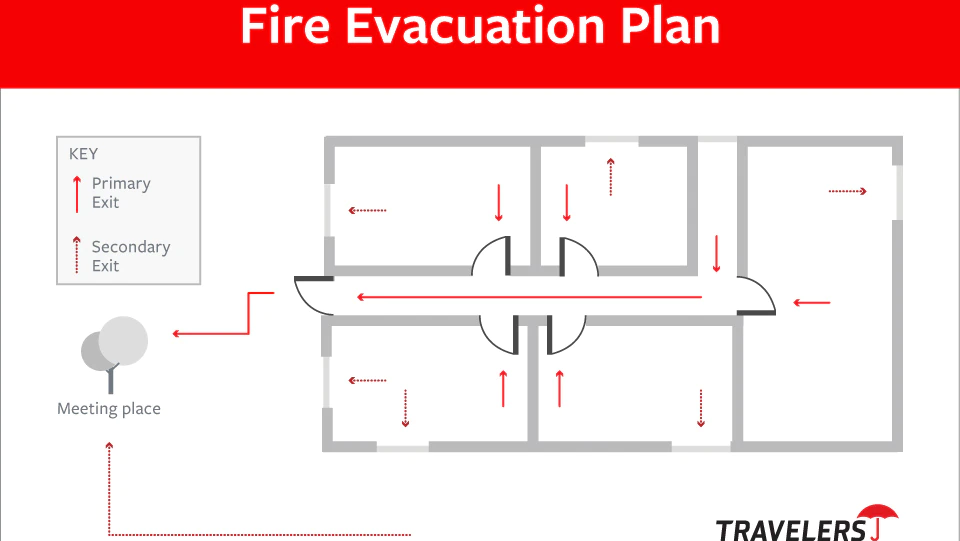Kitchen Fire Safety

(DESCRIPTION)
Logo, Travelers. Title: Preventing Kitchen Fires.
(SPEECH)
SPEAKER: When it comes to kitchen fires, there are cooking and non-cooking risks and best practices to be mindful of.
(DESCRIPTION)
An illustrated kitchen appears. A pot flames on a stovetop. The view splits in three with the stove in the middle. On the left is a blank checklist of cooking best practices. On the right is a blank checklist of non-cooking best practices.
(SPEECH)
First, when cooking, never leave the cooking area unattended. Don't cook when tired, drowsy, or under the influence of alcohol or medication.
Avoid wearing loose clothing that might drop over or onto a heat source.
(DESCRIPTION)
A circular shape appears on the screen with a person in it who appears be asleep. A second circular shape appears with a person in it yawning. A third circular photo appears with a martini and medicine bottle in it. A red bathrobe disappears, revealing a tucked-in blue collared shirt.
(SPEECH)
Keep your cooking area free of combustible materials.
(DESCRIPTION)
A cookbook, hand towels, and a notepad disappear from the kitchen.
(SPEECH)
When cooking with oil, keep a lid handy and clean up any spilled or splattered grease.
(DESCRIPTION)
A lid appears beside a pot of boiling oil. A sponge swipes over the view trailing sparkles behind it. A fire extinguisher appears on the wall near the stove.
(SPEECH)
Keep a fire extinguisher that's designed for use in the kitchen readily accessible at all times. Don't dispose of hot grease in the trash can. Let it cool in the pan, and then dispose of it. Don't store anything in your oven.
(DESCRIPTION)
Bread and trash appear in the oven with a cross through it.
(SPEECH)
Now, let's tackle some things to look for when it comes to non-cooking fire risks. Plug all kitchen appliances directly into wall outlets. Never use an extension cord or power strip.
(DESCRIPTION)
A stand mixer appears with a power cord. A green check flashes besides a wall outlet. A crossed circle appears beside a power strip.
(SPEECH)
Check appliances for power cords that are frayed or damaged. If you find one, don't use the appliance until it's repaired.
(DESCRIPTION)
A frayed and sparking power cord appears, then a blue cover slides over it.
(SPEECH)
Unplug small appliances when not in use.
(DESCRIPTION)
A toaster unplugs from the wall. A sponge swipes over an exhaust hood. A dirty filter slides out and is replaced with a clean one.
(SPEECH)
Regularly check and clean your stove hood, filter, or other exhaust system over the stove. Finally, never use your oven to heat your home.
(DESCRIPTION)
The oven door opens and heat waves stream out. The thermostat reads 68, heat off.
(SPEECH)
Talk to your Travelers representative or independent agent today.
(DESCRIPTION)
Logo, Travelers. Text, Talk to your Travelers representative or independent agent today. Travelers dot com. Travelers Casualty and Surety Company of America and its property casualty affiliates. One Tower Square, Hartford, CT 06183. This material does not amend, or otherwise affect the provisions of any insurance policy issued by Travelers. It is not a representation that coverage does or does not exist for any particular claim of loss under any such policy. Coverage depends on the facts and circumstances involved in the claim or loss, all applicable policy provisions, and any applicable law.
When thinking of the cause of a kitchen fire, it is common to think of cooking. But not all kitchen fires start because of cooking hazards. Non-cooking related fires commonly involve refrigerators, freezers or dishwashers. The following tips can help prevent non-cooking related fires from occurring in your kitchen.
- Plug all kitchen appliances, including microwaves, toasters and coffee makers, directly into a wall outlet. Never use an extension cord as it can overheat and cause a fire.
- Use the right outlet for the right appliance. For larger appliances, such as ovens and refrigerators, be sure to only use properly grounded outlets with circuits that match the rating plate on the appliance. If you have older 2-prong outlets in other locations of your kitchen, have a qualified electrician replace it with a properly grounded 3-prong outlet. Do not use an adapter.
- Replace any power cords that become frayed or otherwise damaged. Never use a cord that shows cracks or other damage.
- When moving kitchen appliances, be aware of power cords. Rolling over or pinching power cords can damage them.
- Unplug small appliances when not in use.
- Keep your stove and oven clean. Built up food splatter or grease can later ignite when the stove or oven is turned on for cooking.
- Check and clean stove hoods and filters regularly. If your stove hood vents externally, make sure insects or birds do not build nests or otherwise impede air flow through it.
- Never use a gas or propane oven to heat your home. Not only is this a fire hazard, but it can also give off toxic gases.
What to Do If a Kitchen Fire Flares Up
By exercising caution at all times in your kitchen, you can help reduce the risk of a kitchen fire. But if a fire does flare up, you need to be prepared.
- Your safety should always come first. If you are unsure about whether it is safe to fight the fire, leave the scene, call 911 for help, and let the fire department control the fire.
- If a small fire flares up and you are going to attempt to extinguish it, call 911 for help first. A fire may grow out of control more quickly than you anticipate. It is safer to have help already on the way.



